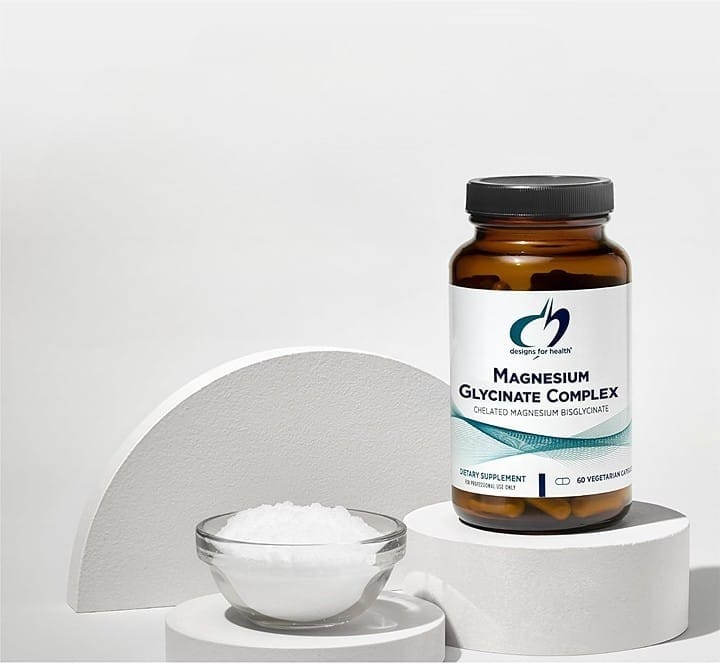Key Takeaways:
- Magnesium bisglycinate is a highly absorbable form of magnesium that is bound to two glycine molecules, enhancing its effectiveness and reducing gastrointestinal discomfort.
- It plays a crucial role in over 300 enzymatic reactions in the body, supporting muscle and nerve function, bone health, and cardiovascular health.
- Due to its high bioavailability and minimal side effects, magnesium bisglycinate is considered an effective magnesium supplement for addressing magnesium deficiency and improving overall health.
Magnesium bisglycinate, often referred to as magnesium diglycinate or magnesium glycinate, is a form of magnesium that is increasingly gaining attention in the health and wellness community. This compound is known for its superior absorption rates and its gentle effect on the stomach compared to other forms of magnesium. Understanding what magnesium bisglycinate is and how it functions can help individuals make informed decisions about their health and dietary supplements.
Understanding Magnesium Bisglycinate

Magnesium bisglycinate is a chelated form of magnesium, meaning that the magnesium ion is bound to two glycine molecules. This unique bonding helps protect the magnesium from interacting with other substances in the gut that might inhibit its absorption. As a result, magnesium bisglycinate is one of the most bioavailable forms of magnesium, making it a preferred choice for those seeking to increase their dietary magnesium intake without experiencing adverse effects commonly associated with other magnesium supplements.
The Importance of Magnesium in the Body
Magnesium is an essential mineral that is vital for many bodily functions. It plays a key role in muscle and nerve function, supports normal blood pressure, and is involved in energy production. Despite its importance, magnesium deficiency is relatively common, often due to insufficient dietary intake of magnesium-rich foods such as green leafy vegetables, nuts, and seeds. Supplementing with magnesium bisglycinate can help address these deficiencies, ensuring that the body has enough magnesium to function properly.
Magnesium Bisglycinate vs. Other Forms of Magnesium
When comparing magnesium bisglycinate to other forms of magnesium such as magnesium oxide, magnesium citrate, and magnesium malate, it is important to consider factors like absorption rates and potential gastrointestinal effects. Magnesium oxide, for example, may have higher levels of elemental magnesium but is poorly absorbed by the body. Magnesium citrate is better absorbed than magnesium oxide and is commonly used as a laxative. However, for those specifically looking for maximum absorption with a minimal laxative effect, magnesium bisglycinate is often recommended.
Benefits of Magnesium Bisglycinate for Bone Health

Magnesium plays a critical role in bone formation and maintenance. It helps in the conversion of vitamin D into its active form, which is crucial for calcium absorption. Adequate magnesium levels are essential for maintaining healthy bones and preventing conditions such as osteoporosis. Magnesium bisglycinate, with its high bioavailability, is particularly effective in supporting bone health and ensuring that the body's magnesium levels are sufficient.
Magnesium Bisglycinate and Insulin Sensitivity
Magnesium bisglycinate, a form of magnesium that is bound to the amino acid glycine, has been studied for its potential benefits in improving insulin sensitivity. Research suggests that magnesium plays a crucial role in glucose metabolism, and adequate magnesium levels are essential for the proper function of insulin, the hormone that regulates blood sugar levels. Studies have shown that magnesium glycinate supplements can help in maintaining healthy blood sugar levels, making it a valuable dietary supplement for those at risk of developing diabetes.
Furthermore, the unique properties of magnesium bisglycinate allow for better absorption and bioavailability compared to other magnesium forms like magnesium oxide or magnesium stearate. This enhanced absorption is particularly beneficial for individuals with reduced insulin sensitivity, as it ensures more consistent magnesium levels in the body. Prospective cohort studies have indicated that higher dietary magnesium intake is associated with a lower risk of type 2 diabetes, highlighting the importance of magnesium in metabolic health.
Magnesium Bisglycinate and Parathyroid Hormone Regulation
Magnesium plays a pivotal role in the regulation of parathyroid hormone, which is crucial for maintaining calcium balance in the blood. Studies have shown that magnesium compounds, including magnesium bisglycinate, can influence the secretion of this hormone. Adequate magnesium status is essential for the proper functioning of the parathyroid glands. When magnesium levels are sufficient, the regulation of calcium and parathyroid hormone remains stable, which is vital for bone health and overall metabolic functions.
Furthermore, magnesium bisglycinate, due to its enhanced bioavailability, may be particularly effective in maintaining healthy parathyroid hormone levels. This can be especially beneficial for individuals at risk of or suffering from conditions like osteoporosis, where hormone regulation and calcium balance are compromised. Regular intake of magnesium bisglycinate could help mitigate these risks by ensuring that the parathyroid glands function correctly, thereby helping the body manage calcium levels more effectively.
Magnesium Bisglycinate and Leg Cramps
Magnesium bisglycinate is often recommended for individuals experiencing frequent leg cramps, a common yet painful condition. Leg cramps, especially those occurring at night, can significantly disrupt sleep and overall quality of life. Magnesium plays a crucial role in muscle relaxation and nerve function, which helps alleviate the involuntary contractions that lead to cramps. Studies suggest that the high bioavailability of magnesium bisglycinate allows for better absorption and effectiveness in preventing these muscle spasms compared to other forms of magnesium.
Furthermore, the gentle nature of magnesium bisglycinate on the stomach makes it a preferred choice for those who need consistent magnesium supplementation to manage their leg cramps. Unlike other magnesium formulations that can cause gastrointestinal discomfort, magnesium bisglycinate is bound to the amino acid glycine, which facilitates a smoother absorption process and reduces the likelihood of digestive issues. This characteristic makes it ideal for long-term use, particularly for older adults and athletes who frequently suffer from leg cramps.
Magnesium Bisglycinate and Digestive Health
Magnesium bisglycinate is often touted for its superior absorption and gentle effects on the stomach, making it an ideal choice for those concerned with digestive health. Unlike other forms of magnesium that can cause diarrhea and other gastrointestinal issues, magnesium bisglycinate binds magnesium to glycine, a non-essential amino acid that facilitates easier absorption and minimizes stomach upset. This property makes it particularly beneficial for individuals with sensitive digestive systems or those who are prone to gastrointestinal distress from other magnesium supplements.
Furthermore, the role of magnesium as an important mineral in the body extends to the regulation of digestive enzymes. By promoting the proper function of these enzymes, magnesium bisglycinate helps in the breakdown and digestion of food, thus supporting overall digestive health. This is especially important in a diet high in processed foods, which can often lack essential nutrients, including magnesium. Regular intake of magnesium bisglycinate can help maintain optimal digestive function and prevent common digestive problems.
Magnesium Bisglycinate and Citric Acid Interaction
Magnesium bisglycinate often includes citric acid in its formulation to enhance absorption and stability. Citric acid, a natural preservative and antioxidant found in citrus fruits plays a crucial role in the metabolic pathway known as the citric acid cycle, which is essential for energy production at the cellular level. When combined with magnesium, citric acid helps in stabilizing the magnesium compound, allowing for better absorption of magnesium in the intestine, thus increasing its bioavailability and effectiveness in the body.
The interaction between magnesium bisglycinate and citric acid not only boosts the absorption rates but also enhances the overall efficacy of magnesium supplements. This combination can be particularly beneficial in individuals with deficiencies or those requiring higher doses of magnesium. The presence of citric acid in magnesium supplements can also mitigate the laxative effect often associated with other forms of magnesium, making magnesium bisglycinate a preferred choice for those with sensitive digestive systems or those who are prone to gastrointestinal distress.
Magnesium Bisglycinate as a Potential Aid for Primary Insomnia
Magnesium bisglycinate has been studied for its potential benefits in improving sleep quality, particularly in individuals suffering from primary insomnia. Primary insomnia, characterized by difficulty initiating or maintaining sleep, can significantly impact life quality. Magnesium plays a pivotal role in regulating neurotransmitters that are involved in sleep cycles. Its calming effect on the nervous system helps to prepare the body for sleep, making it easier to fall asleep and stay asleep throughout the night.
Research suggests that magnesium bisglycinate, due to its superior absorption and gentle effects on the stomach, can be an effective supplement for enhancing sleep quality. It aids in the activation of the parasympathetic nervous system, which is responsible for promoting calm and relaxation. By improving GABA (gamma-aminobutyric acid) function, a neurotransmitter that promotes sleep, magnesium bisglycinate can help alleviate symptoms of primary insomnia, leading to more restful nights and better overall health.
Magnesium Bisglycinate and Muscle Recovery

Magnesium plays a critical role in muscle function and recovery, making magnesium bisglycinate a popular supplement among athletes and individuals with active lifestyles. It helps in the relaxation of muscles after contraction, which is crucial in preventing cramps and spasms. Additionally, magnesium is vital for the synthesis of protein, which is essential for muscle mass and repair. By ensuring an adequate intake of magnesium, particularly in a form that is easily absorbed like magnesium bisglycinate, individuals can support quicker recovery times and reduced muscle soreness after physical activity.
Moreover, the enhanced bioavailability of magnesium bisglycinate allows for better utilization of this important mineral in the body. For athletes or anyone engaged in regular physical exercise, how much magnesium is needed can vary, but the efficient absorption of magnesium bisglycinate ensures that the muscles receive the magnesium they require to recover and perform optimally. This can be particularly beneficial for those looking to increase muscle mass and improve overall physical performance, making magnesium bisglycinate a key supplement in sports nutrition.
Magnesium Bisglycinate in Bariatric Surgery Patients
Bariatric surgery patients often face challenges with nutrient absorption, including essential minerals like magnesium. This is primarily due to the alterations in the gastrointestinal tract and reduced stomach acid production, which can impede the absorption of various forms of magnesium. Magnesium bisglycinate, known for its superior absorption properties, can be particularly beneficial for these patients. Its ability to bind magnesium effectively with glycine allows for better uptake and retention, helping to prevent deficiencies that can complicate post-surgery recovery.
A systematic review of nutritional interventions in bariatric surgery patients highlights the importance of tailored nutrient supplementation to ensure long-term health and metabolic stability. Incorporating powdered magnesium, specifically magnesium bisglycinate, into their regimen can support muscle function, bone health, and a healthy circadian rhythm, all of which are crucial for recovery and overall well-being post-surgery. Regular monitoring and dosage adjustments, guided by medical professionals, are essential to maximize the health benefits while minimizing the risk of magnesium toxicity.
Magnesium Bisglycinate in Managing High Blood Pressure
High blood pressure, or hypertension, is a common condition that can lead to severe cardiovascular issues if not managed properly. Magnesium bisglycinate has been studied for its potential in helping to lower high blood pressure. This form of magnesium is known for its superior absorption and bioavailability, which means it can more effectively contribute to the dilation of blood vessels, thereby reducing blood pressure levels. Systematic reviews have suggested that magnesium supplementation can be an adjunct therapy for people with hypertension, alongside traditional medications.
The role of magnesium in blood pressure regulation is also linked to its ability to improve endothelial function and reduce arterial stiffness. By incorporating magnesium bisglycinate into the diet, individuals may experience a natural and gentle way to manage their blood pressure levels. This is particularly important for those who are looking to reduce their reliance on medications or are seeking to treat symptoms of high blood pressure through lifestyle and dietary changes.
Magnesium Bisglycinate for Migraine Relief

Migraine headaches are a debilitating condition that can significantly affect the quality of life. Emerging evidence from systematic reviews and clinical trials suggests that magnesium bisglycinate may offer relief for migraine sufferers. Magnesium is known to influence several pathways involved in migraine pathogenesis, including neurotransmitter release, inflammation, and blood vessel constriction. By stabilizing these pathways, magnesium bisglycinate can potentially reduce the frequency and severity of migraine attacks.
The effectiveness of magnesium bisglycinate in treating symptoms of migraine is attributed to its ability to improve muscle relaxation and nerve function. Unlike other supplements that might cause gastrointestinal discomfort, magnesium bisglycinate is generally well-tolerated, making it a suitable option for long-term use in migraine management. Regular intake of magnesium glycinate supplements, as part of a comprehensive treatment plan, has been shown to provide substantial relief to many migraine sufferers, improving their overall quality of life.
Magnesium Bisglycinate and Muscle Function
Magnesium is also essential for proper muscle function. It helps in the contraction and relaxation of muscles, reducing the occurrence of muscle cramps and spasms. Athletes and individuals with active lifestyles may find magnesium bisglycinate beneficial not only for improving exercise performance but also for aiding in muscle recovery post-exercise. Its ability to regulate neuromuscular signals and relax the muscles helps in enhancing overall muscle function.
Cardiovascular Health and Magnesium Bisglycinate
The heart, like any other muscle in the body, requires magnesium to function optimally. Magnesium bisglycinate helps maintain normal heart rhythms and supports healthy blood pressure levels. Studies have shown that adequate magnesium intake is associated with a lower risk of cardiovascular disease, highlighting the importance of magnesium in cardiovascular health.
Impact on Sleep and Stress
Magnesium has a calming effect on the nervous system, which can enhance sleep quality and improve symptoms of insomnia. Magnesium bisglycinate, in particular, is noted for its ability to improve sleep due to its high absorbability and its gentle impact on the stomach, making it a suitable option for those who struggle with sleep issues.
Dosage and Safety
When considering taking magnesium bisglycinate, it is important to consult with a healthcare professional to determine the appropriate dosage. The tolerable upper intake level for supplemental magnesium for adults is 350 mg per day, although needs can vary based on age, gender, and health status. Magnesium bisglycinate is generally well-tolerated, but taking too much magnesium can lead to adverse effects such as diarrhea, nausea, and abdominal cramping.


Can magnesium bisglycinate help with anxiety?
Yes, magnesium bisglycinate can help alleviate anxiety. Magnesium regulates neurotransmitters, which send signals throughout the brain and nervous system. Its calming effect can reduce anxiety symptoms and promote relaxation.
Is magnesium bisglycinate safe for everyone?
While magnesium bisglycinate is safe for most people, those with kidney disease or severe heart conditions should consult a healthcare professional before starting any new supplement, including magnesium bisglycinate.
How does magnesium bisglycinate compare to magnesium citrate?
Magnesium bisglycinate is better absorbed and less likely to cause laxative effects compared to magnesium citrate, making it a preferred choice for those who need higher doses of magnesium without gastrointestinal discomfort.

Magnesium bisglycinate is a highly effective form of magnesium supplementation, known for its superior absorption and minimal gastrointestinal side effects. It supports various bodily functions, including muscle and nerve function, bone health, and cardiovascular health. By choosing magnesium bisglycinate, individuals can efficiently address magnesium deficiencies and improve their overall health and well-being.










